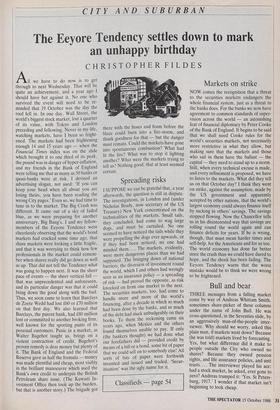CITY AND SUBURBAN
The Eeyore Tendency settles down to mark an unhappy birthday
CHRISTOPHER F I LDES
All we have to do now is to get through to next Wednesday. That will be quite an achievement, and a year ago I should have bet against it. No one who survived the event will need to be re- minded that 19 October was the day the roof fell in. In one day, Wall Street, the world's biggest stock market, lost a quarter of its value, with Tokyo and London preceding and following. Never in my life, watching markets, have I been so fright- ened. The markets had been frightening enough 14 and 15 years ago — when the Financial Times index was on the slide which brought it to one third of its peak, the pound was in danger of hyper-inflation, and my friends in the Bank of England were telling me that as many as 50 banks or quasi-banks were at risk. I devised an advertising slogan, not used: 'If you can keep your head when all about you are losing theirs, you have been reading the wrong City pages.' Even so, we had time to tune in to the market. The Big Crash was different. It came out of a sky of faded blue, as we were preparing for another anniversary, Big Bang's. 1 and my fellow- members of the Eeyore Tendency were cheerlessly observing that the world's bond markets had cracked some time ago, that share markets were looking a little fragile, and that it was worrying to think how few professionals in the market could remem- ber when shares really did go down as well as up. That did not tell the Tendency what was going to happen next. It was the sheer pace of events — the sheer vertical fall that was unprecedented and unforeseen, and its particular danger was that it could bring down the good along with the bad. Thus, we soon came to learn that Barclays de Zoete Wedd had lost £60 or £70 million on that first day. We also learned that Barclays, the parent bank, had £80 million lent or committed to another broking firm, well known for the sporting punts of its personal customers. Panic in a market, as Walter Bagehot taught us, brings on a violent contraction of credit. Bagehot's proven remedy is dear money but plenty of it. The Bank of England and the Federal Reserve gave us half the formula — money was made plentiful and cheap, most visibly in the brilliant manoeuvre which used the Bank's own credit to underpin the British Petroleum share issue. (The Kuwaiti In- vestment Office then took up the burden, but that is another story.) The brigade got
there with the hoses and foam before the blaze could burn into a fire-storm, and thank goodness for that — but the danger must remain. Could the markets have gone into spontaneous combustion? What had lit the fire? What was to stop it lighting another? What were the markets trying to tell us? Nothing good: that at least seemed certain.


























































 Previous page
Previous page